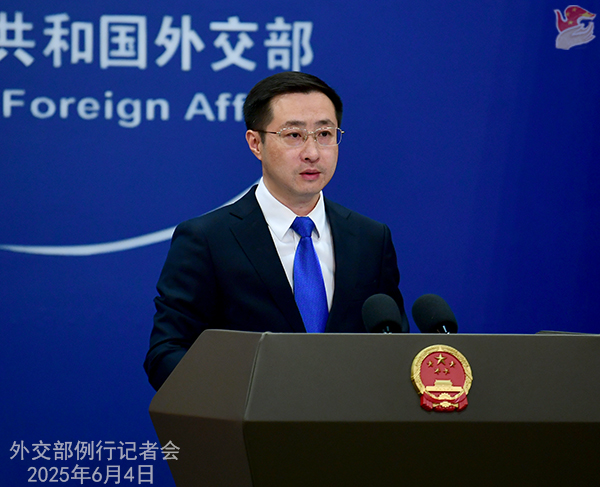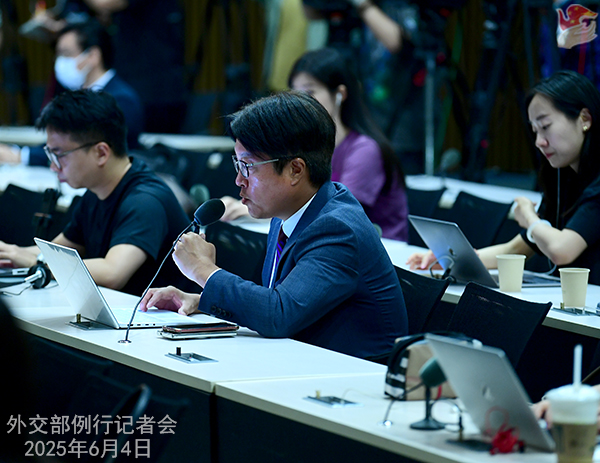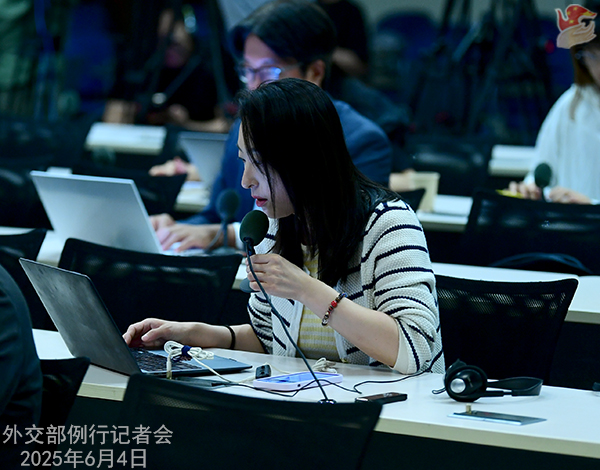
People’s Republic of China


Xinhua News Agency: According to reports, Japanese Prime Minister Shigeru Ishiba said at the Nikkei Forum 30th Future of Asia that, Japan must remember the painful memory and lessons of history, so that it will not repeat past mistakes of war. Ishiba said that Japan has taken on a path of peace after the war, and this will not change in the future. By learning from history, Japan will not be an invasive country. Comments say the words by Prime Minister Ishiba demonstrate a positive attitude of learning from history and avoiding wars. What’s China’s take on this?
Lin Jian: In November 2024, Prime Minister Ishiba said during his meeting with President Xi Jinping in Lima that Japan has upheld a path of peaceful development in the spirit of facing history squarely and looking to the future. This time Prime Minister Ishiba further announced that Japan should reflect on history and remember the lessons so that Japan would not repeat past mistakes of war. We attach importance to his words.
A correct perception and attitude towards history and concrete actions that demonstrate reflection on and apology for the history of aggression are important premises for Japan to rejoin the international community after World War II. They matter to the political foundation of China-Japan relations, to Japan’s relationship with neighboring countries and to Japan’s global image. This year marks the 80th anniversary of the Victory of the Chinese People’s War of Resistance Against Japanese Aggression and the World Anti-Fascist War. Japan once again faces the questions posed by history and moral justice. History illuminates the present with stark lessons. The four political documents between China and Japan established the important political principle of “learning lessons from history and looking ahead to the future.” Japan made serious political commitments. We hope Japan will deeply reflect on its historical crime, fully learn the lessons and, out of a sense of responsibility to history, to the people and to the future, make a clean break with any move that seeks to whitewash or cover up the history of aggression. We hope Japan will stick to the path of peaceful development, and earn through its actions the trust of its Asian neighbors and the international community.
Channel A: Today, some media in China say that China hopes the ROK President will take a balanced approach in foreign policy. What is China’s expectation for the ROK’s foreign policy towards China, and does China think that the new government of the ROK will improve China-ROK relations?
Lin Jian: China-ROK relations are propelled fundamentally by the two countries’ common interests. The relations do not target any third party, and should not be disrupted by any third-party factor. China opposes making countries choose sides and bloc confrontation. We stand ready to work with the ROK to pursue sound and steady bilateral ties to the benefit of the two peoples, and play a positive role in making our region more peaceful, stable and prosperous.
News 1 Korea: Today, the White House congratulated Lee Jae-myung on winning the presidency, and expressed its concern over China’s interference and influence in democracies around the world. What’s China’s take on this?
Lin Jian: We saw that statement. China always follows the principle of non-interference in other countries’ internal affairs, and has never and will never interfere in the internal affairs of any country. We urge the U.S. to change the habit of assuming that China would act in the way that the U.S. does, and stop trying to sow discord between China and the ROK.
CRI: The Pakistani government and the Afghan interim government announced the elevation of the rank of their missions in Islamabad and Kabul from chargé d’affaires to ambassador. What’s China’s comment?
Lin Jian: China welcomes the announcement of the Pakistani government and the Afghan interim government to elevate their diplomatic ties to the ambassadorial level. We believe this will help the two countries increase trust and cooperation and work jointly for the region’s peace and stability. This is also an important and positive move of the two sides to implement the outcomes of the informal foreign ministers’ meeting between China, Afghanistan and Pakistan in May. China stands ready to continue to play a constructive role in the improvement of Pakistan-Afghanistan relations.
China will work with Pakistan, Afghanistan and other regional countries to uphold the peace, stability and development of the region and stay committed to the building of a community with a shared future with neighbors.

Dragon TV: It’s reported that Lee Jae-myung, the candidate of the Democratic Party, was elected President of the Republic of Korea, according to the final vote count released on June 4 by the National Election Commission. Do you have any comment? What’s China’s expectation for its relations with the ROK going forward?
Lin Jian: President Xi Jinping has sent a congratulatory message to President Lee Jae-myung on his election as the 21st President of the ROK.
China and the ROK are each other’s important close neighbors and cooperation partners. China highly values its relations with the ROK and stands ready to work with the ROK to cherish the shared commitment that led to the establishment of diplomatic ties, firmly pursue good neighborliness and friendly ties, stick to the goal of win-win cooperation, and jointly advance the China-ROK strategic cooperative partnership and bring greater benefit to the two countries and peoples.
China Daily: Recently at the Shangri-La Dialogue, a European leader linked the Taiwan question with the Ukraine issue, alluded to so-called “China threat” on the South China Sea issue, and suggested that NATO has the ground to “be involved” in the Asia-Pacific. What’s China’s comment?
Lin Jian: We firmly oppose relevant remarks. Taiwan is an inalienable part of China’s territory. The Taiwan question is entirely China’s internal affair. The Taiwan question and the Ukraine crisis are not comparable at all. China firmly opposes any remarks and moves that seek to mischaracterize or distort the nature of the Taiwan question, and urges relevant parties to abide by the one-China principle through concrete actions and respect China’s sovereignty and territorial integrity.
The current situation in the South China Sea is generally stable. There isn’t any problem with the freedom of navigation and overflight that countries enjoy in accordance with the law. China stands for properly resolving maritime disputes and differences through negotiation and consultation with countries directly concerned on the basis of respecting historical facts. Countries outside of the region need to respect the efforts of regional countries to uphold peace and stability in the South China Sea, instead of instigating tensions and creating disputes.
As a regional defensive organization, NATO has no right to reach beyond its geographical scope and mandate defined by its treaty. China firmly opposes NATO’s attempt to advance eastward into the Asia-Pacific, stir up tensions and create confrontation in the region, and sabotage regional and even global peace and stability. Asia-Pacific countries do not welcome NATO in the Asia-Pacific and the region certainly does not need an Asia-Pacific NATO.
Let me stress that Asia is the common home for China and other Asian countries. In recent years, thanks to the joint effort of regional countries, Asia has maintained rapid growth and become a pacesetter in global growth and peaceful development. China stays committed to the principle of amity, sincerity, mutual benefit and inclusiveness in neighborhood diplomacy, firmly opposes bloc confrontation and never seeks so-called sphere of influence. Relevant parties should not make ill-intentioned speculation or sow discord between Asia-Pacific countries based on Cold War mentality. What they should do is to contribute to peace, stability and prosperity in the Asia-Pacific.
AFP: The United States Justice Department said Tuesday that two Chinese students have been charged with smuggling a toxic fungus into the United States that they plan to research at an American university. Does the Foreign Ministry have any comments on the case?
Lin Jian: I am not familiar with that. The Chinese government always asks Chinese nationals overseas to strictly observe local laws and regulations, and protects their legitimate and lawful rights and interests in accordance with the law.




